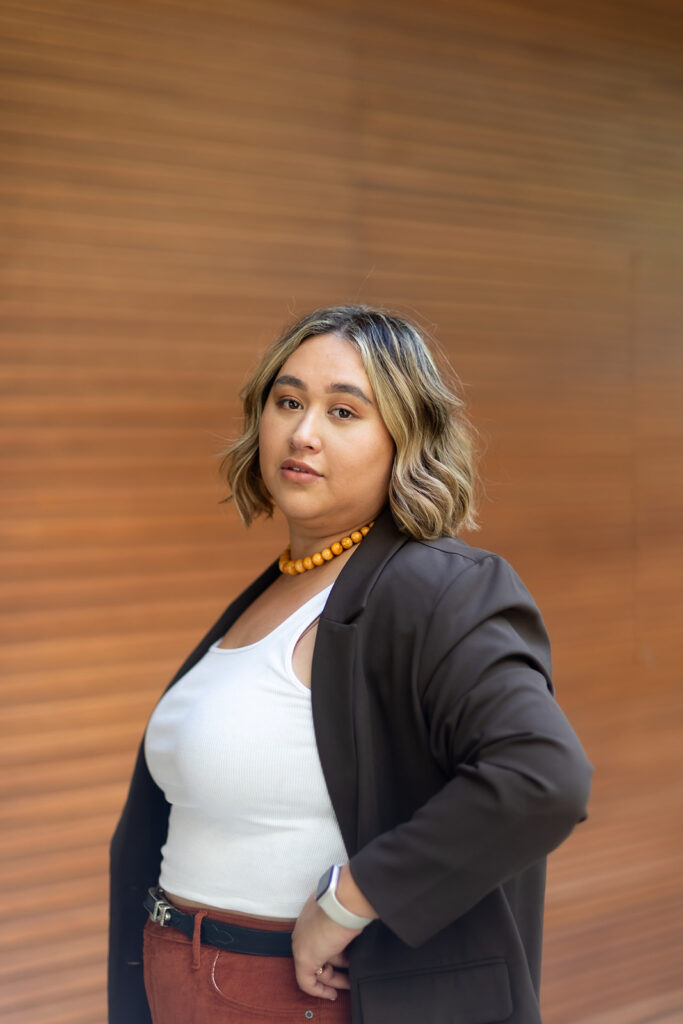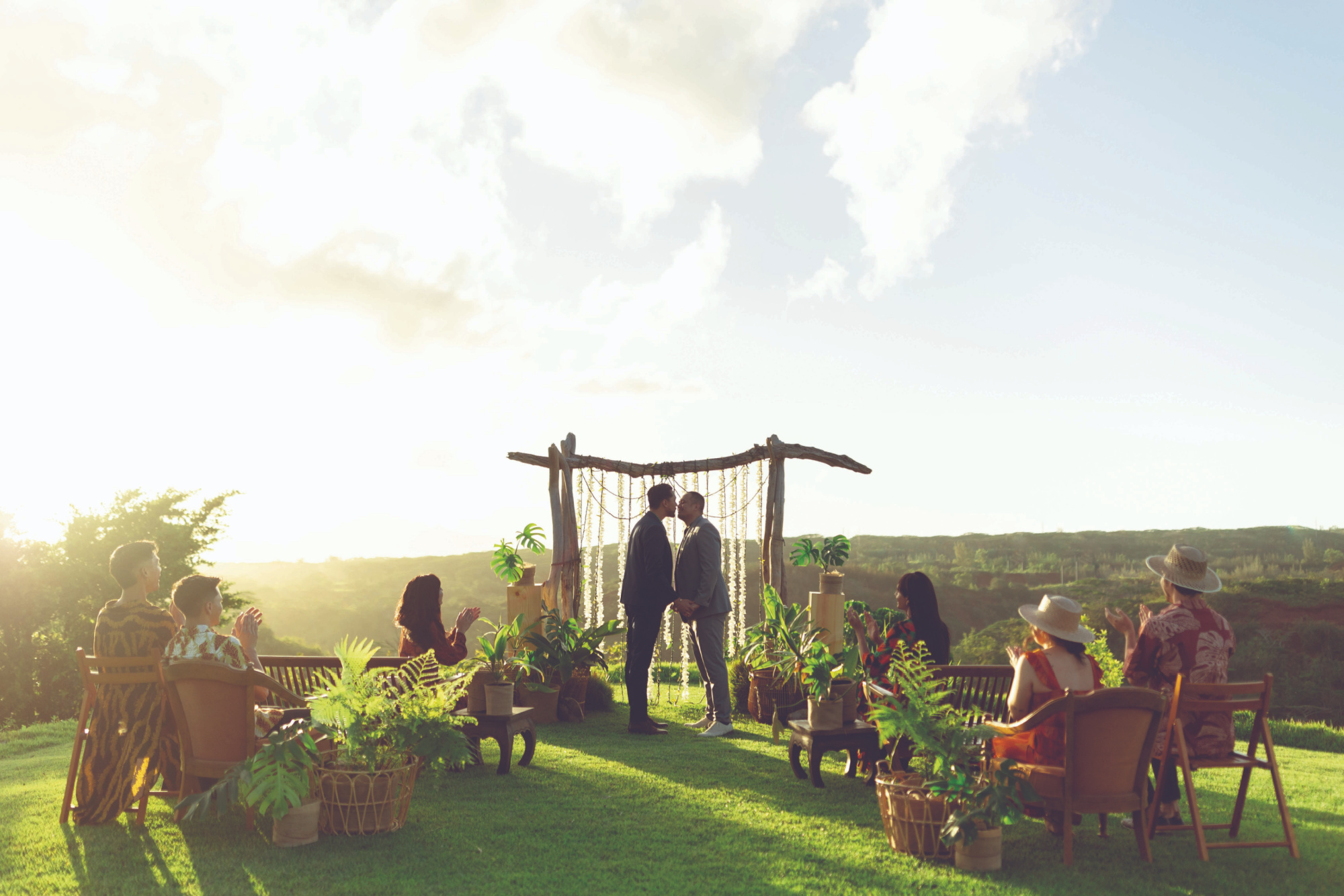Planning the perfect wedding comes down to priorities and respect, no matter whether you’re queer or straight.
Words by Marc Graser
Images by Mahina Choy-Ellis
“I tell people all the time that you’ll never not remember your first queer wedding that you’ve been to because it is the most fun,” says Zabrina Zablan-Duvauchelle, an event planner and founder of The Gay Agenda Collective. “It’s stripped down at its core and about two people who absolutely are obsessed with one another and love each other. You can feel it.”
With an estimated 16,000 queer weddings taking place across the Hawaiian Islands each year, Zabrina and her team have built a successful business around working with couples who don’t want a conventional wedding ceremony, and desire more autonomy in the choices they make.
“That’s how they find us,” Zabrina says. “We’ve been able to be very meticulous on the clientele that we bring on because we’ve been able to build our brand to exude that notion of non-traditional and queering the lines. If that’s not what they’re looking for, this is an oversaturated industry;
I have a lot of colleagues that I know they’ll work great with.”
Out of the 72 weddings TGA produced in 2023, 47 of them were queer. Typically, half of its weddings are for LGBTQ+ couples. As of February, the company had already booked 50 weddings, with the goal to get to 100 by the end of the year.
Nearly half of TGA’s clients fly in from California—the Bay Area or Southern California—followed by New York, Mexico, and the Midwest.
As the first queer native Hawaiian person to sit on the board of the Oahu Wedding Association, and chair the Honolulu Pride Festival, Hawaii’s largest LGBTQ+ event, Zabrina is on a mission to do business with a community that she feels has long been ostracized by the wedding industry.
“It’s a great responsibility for me,” she says.
Read Also: Queer Wedding Planning Tips
I tell people all the time that you’ll never not remember your first queer wedding that you’ve been to because it is the most fun.
— Zabrina Zablan-Duvauchelle, founder of The Gay Agenda Collective



Rough Start
The Gay Agenda started in 2018, when Zabrina and her wife, Ipolani Duvauchelle, started the process of planning their own wedding. It wasn’t easy. “Our experience was so difficult,” says Zabrina, whose background is not as an event planner; she studied to become a physical therapist, but quickly realized that wasn’t the best fit for her future.
“We had a lot of situations where we had to continuously come out to our vendors,” Zabrina says, adding that the two were misgendered and lost vendors weeks leading up the special day “because they realized we were a queer couple.”
The experience left a sour taste in Zabrina’s mouth—so much so that she actually spent a year cleansing her palette working in a restaurant in Pasadena. She would move to the events side of the business and kept having this feeling that Hawaii was going to turn into a new queer destination for weddings. “Folks were looking for something that was still pretty tropical but within a reasonable amount of travel time,” she says. “I told my wife I think we have to move home; I think that’s actually where we are supposed to be. I felt like there was a hole in the industry that wasn’t being filled.”
Six years later, Zabrina and Ipolani are based on the west side of Oahu, in Kapolei, where they run The Gay Agenda. The two met at Azusa Pacific University, and lived in Pasadena for eight years.
We are wedding planners on a mission to help those who don’t fit into the norms of what a wedding looks like.
— Zabrina Zablan-Duvauchelle

Mission Focused
While weddings are an important business, The Gay Agenda is starting to expand into more corporate and other events. That’s why the name of the company isn’t so focused on nuptials in a punny kind of way.
“We kept it really loose because I knew that one day TGA would evolve outside of the wedding space and eventually move into the event space as a whole,” says Zabrina, who ultimately wants to invest in smaller queer-owned businesses in Hawaii and make them part of the collective.
It’s also about making a statement. “We’ve always lived pretty radically, my wife and I, and it’s always been about this idea of pushing my agenda. Weddings have always been that means to an end of being able to get to that point.”
Zabrina likes to say that her staff of 10 are “wedding planners on a mission to help those who don’t fit into the norms of what a wedding looks like,” she says. That goal has attracted non-queer couples as well who are looking to support LGBTQ+-owned businesses, and are non-traditional in their own respects, too.
“You’ve got to have a mission behind why you do something,” Zabrina says. “That is something people are looking for, especially in the queer community. They want to support people who have something that they’re fighting for and pushing the pendulum forward a little bit.”
Saying you do gay weddings because you like gay people is not enough to support an entire community who’s been ostracized in this industry.
— Zabrina Zablan-Duvauchelle


Time to Evolve
When she conducts allyship or inclusivity training with local wedding vendors, “folks who’ve been in this industry 10 to 20-plus years are not interested in trying to evolve,” Zabrina says.
It’s frustrating for Zabrina because representation matters. Around 89% of queers couples planning a wedding will see if a vendor has other queer couples in their portfolio or on their social media feeds. And 91% will ask if they’ve worked with queer couples in the past.
In her role with the Oahu Wedding Association, Zabrina often finds herself trying to get the 160 vendors that are members to think about the why behind their businesses. “Is it truly just to make money because weddings are so lucrative, or is there a reason behind why they love weddings?” Zabrina asks. “Saying you do gay weddings because you like gay people is not enough to support an entire community who’s been ostracized in this industry. You have to do a little bit more. Queer couples are not different, we just don’t fall into the normalities that you have in the wedding industry.”
The wedding business is a machine, Zabrina admits. “It completely is,” she says. “It’s hard to make changes, but it’s also not that hard, either. You can do it. We have to evolve.”
The traditional wedding program needs to be customized. Little changes that go a long way include making forms gender neutral, or changing the way you speak to clients. Not everyone’s a bride and groom. “These people are paying you thousands of dollars to be here,” Zabrina stresses. “If you don’t care about people at all, care about the numbers. Queer people historically spend more money on their weddings than their straight counterparts.”
While the pushback Zabrina often gets is “‘This is the way it’s always been done,’ that feels so final and it doesn’t give any room for evolution or change,” says Zabrina, who doesn’t believe resistance comes from vendors thinking queer people don’t deserve a space at the table. “I think it’s this belief that they already have one. Most people want to do better.”
Without change, Zabrina argues, how things are done now will just trickle down and be embraced by employees who may later continue the business or start their own.
“I’ve told my whole team that one day I’m going to become obsolete,” she says. “I’m going to be that old woman who no longer wants to grow anymore, and that’s where you folks come into play.”
Follow The Gay Agenda on Instagram.
Wedding Details
With the marriage of Tapu and Alika (above), The Gay Agenda wanted to showcase a stripped down wedding of two grooms surrounded by friends in a relaxed backyard setting. “When you think of a Hawaii wedding, you sometimes think of over-stylization,” says TGA founder Zabrina Zablan-Duvauchelle. “It doesn’t really look like a typical wedding but it’s still a wedding with a chosen family.” Featured: Jewelry by Maui Divers, guest aloha wear by LexBreezy, and Kini Zamora on the grooms.


